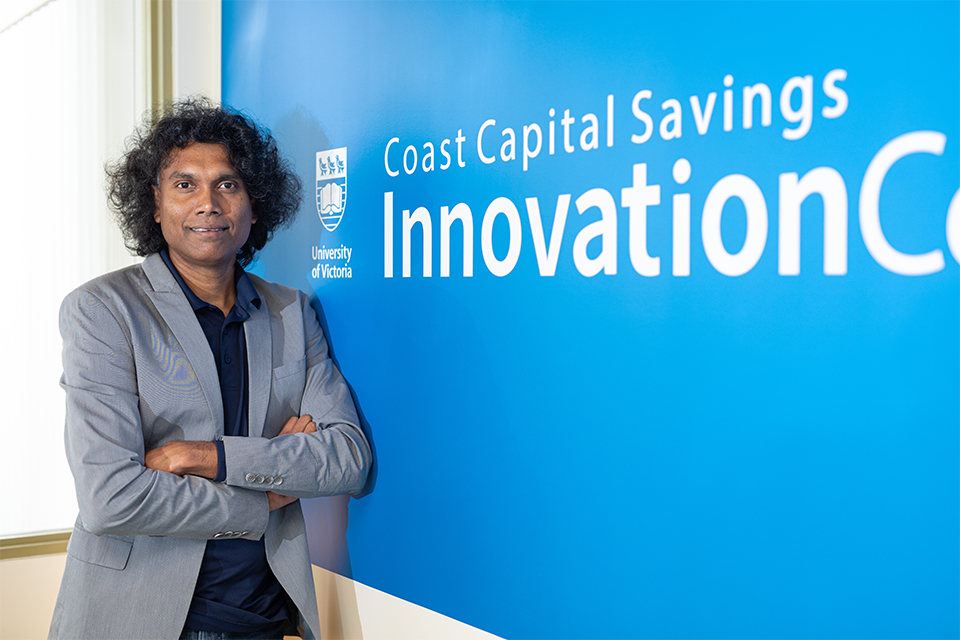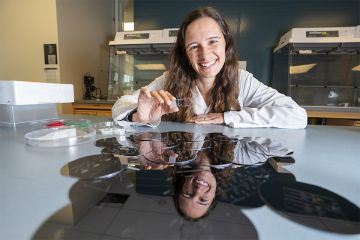Expert Q&A on innovation during COVID-19
Peter B. Gustavson School of Business

From virtual payments to contactless dining, University of Victoria entrepreneurs are solving critical challenges as businesses adapt to new workplace realities during the global pandemic.
Across almost every industry, young innovators see opportunities to envision new ways to live, work and play. They are taking solutions developed at UVic’s Coast Capital Savings Innovation Centre (CCSIC) into local communities and, in some cases, the global stage. Jerome Etwaroo, the centre’s associate director, works closely with students, faculty, alumni and community partners to help them launch their ideas.
Etwaroo says entrepreneurs are leveraging the campus incubator’s resources, guidance and infrastructure to contribute to new business realities brought on by COVID-19.
Q. As a campus incubator, how do you support entrepreneurs?
A. CCSIC offers resources, guidance and infrastructure to support entrepreneurs test their business models and develop their products and services in a safe environment. Resources include mentorship, access to executives-in-residence, a prototype fund for proof of concepts, and an entrepreneurship support network comprising of mentors, investors, funders and subject-matter experts. In addition, CCSIC hosts seminars, workshops, and pitch and business plan competitions every semester, providing over $60,000 in funding to startup ventures every year.
Q. What are recent examples of success stories?
A. Divdot and Castofly are two UVic-grown companies recently selected by New Ventures BC as Top 10 finalists competing to win up to $250,000 in cash and prizes, including a People’s Choice Award. Both of these companies are also doing great work to contribute to community COVID-19 recovery efforts.
Q. How has COVID impacted entrepreneurs and their ventures?
A. COVID-19 has disrupted the way we work and the way we interact with others. It has changed traditional business activities and operations. This disruption creates new opportunities for innovators and entrepreneurs to develop and bring new products and services to market. During the pandemic, we experienced a 100 per cent increase in entrepreneurial activities at UVic.
Many ventures we’ve supported have grown their workforce during this period. Divdot, an online payment platform, successfully raised capital during this period to expand its business operations.
Other ventures have adapted their business models to directly address pandemic challenges. Another example is Pani Energy, developing technologies in collaboration with UVic to track COVID via wastewater systems.
Q. Are there other examples?
A. Yes. Cuboh, Contactless Dining and Castofly are examples. Local restaurant industry has suffered. Cuboh is a restaurant integration platform critical for improving efficiencies in the industry, while Contactless Dining is increasing customer confidence by reducing direct interaction with people. Educators are looking for fast and viable teaching solutions. Castofly empowers educators to create digital content for their students quickly and effectively.
Q. How has COVID changed the way the CCSIC interacts with entrepreneurs?
A. During the pandemic, we changed service delivery to meet the significant increase in demand. We are able to support more entrepreneurs by quickly planning and implementing new programming online. We experienced a record number of participants at our pitch and business plan competitions. We also expanded programming with the successful launch of the W Launch and W Venture programs, which focus on supporting and boosting women entrepreneurs. This fall, three entrepreneurship cohorts are running with a total of over 45 entrepreneurs: a regular stream consisting of 15 entrepreneurs, W Launch stream with about 20 entrepreneurs, and the W Venture stream in collaboration with the partners with 10 ventures.
Q. How are CCSIC entrepreneurs and ventures contributing to local COVID-19 recovery efforts?
A. Many ventures are resilient and leading recovery efforts. Several are experiencing growth and creating new employment opportunities within the region. Others found opportunities during the pandemic to accelerate product development and market intelligence to better position their products and services for a post-COVID world.
Q. What are the supports required for a successful recovery, and how can community-based organizations work together?
A. Supporting startup ventures is a community effort. Many startups at an early stage benefit from mentorship and connections within the community. As we continue to experience a significant increase in entrepreneurial activities, we need to continue to foster and build a robust and resilient entrepreneurial ecosystem within the region.
Q. What does a post-COVID world look like for an entrepreneur?
A. The post-COVID world will be very exciting. The world has changed, and our entrepreneurs are seizing opportunities. The way we interact with each other has become more digitized, especially in the health, education and gaming sectors. I believe many of our ventures are well-positioned to become stronger and contribute to the economic recovery in the region. They are taking innovations developed at UVic to a global stage.
Photos
In this story
Keywords: Research Accelerator Fund, COVID, research, community, administrative, Coast Capital Savings Innovation Centre
People: Jerome Etwaroo





